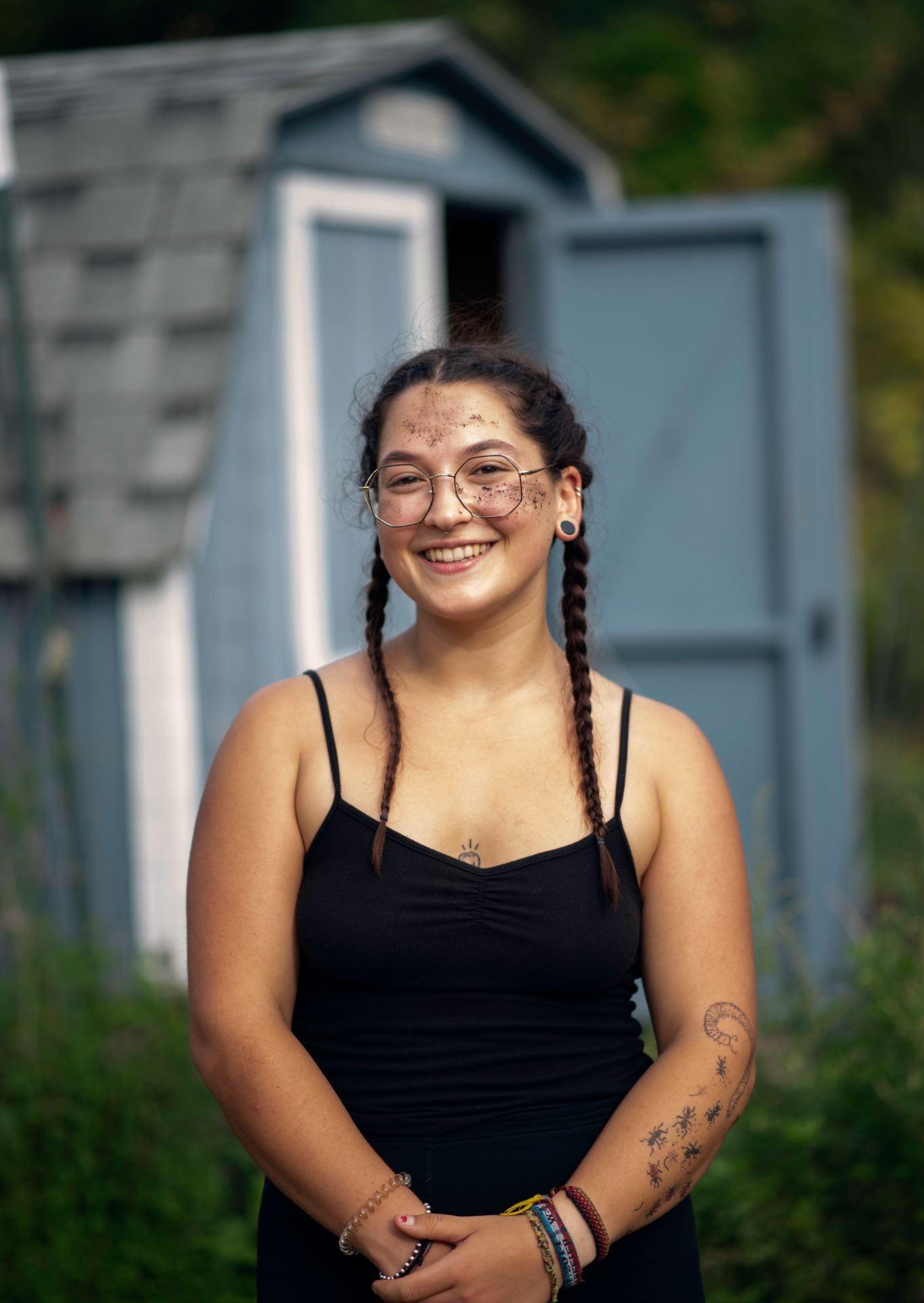Interview by Seth Jones, Senior, Photography BFA
with Zoey Fery, Biology Major, Micro Farm Manager
What is your name and your pronouns?
My name is Zoe, and I go by They/Them.
What is your age and major?
I am 22, it is my senior year, and my major is biology with a minor in geology and environmental geochemistry.
Where are you from?
I am from Rochester New York, more specifically Ontario, but whenever I say that people think I am from Canada.
What types of hobbies or activities are you interested in?
Well right now I am standing on a farm, and I think that is what I am going to be doing. I am really interested in plants, and especially plants that can help humans in some way, so I might go into botany or herbalism, and study that more, maybe even become an apothecary person.
Has SUNY New Paltz campus made you feel welcome?
Oh yeah. I am very involved in the community here. I work at the New Paltz youth center so I know a lot of the local kids. I am part of the DIY music scene, I always go to the house shows. The clubs on campus are a big part for me as well, Students for Sustainable Agriculture, thats who we are. We farm together and we hang out, it’s very fun. I am also in the outing club, we go on hikes every weekend or other larger trips. New Paltz has been a very welcoming place for me and I have made a lot of new friends.
How does the community here at New Paltz differ from your home?
There isn’t a community at home. It’s upstate New York, everybody is very sour and not warm at all. It is completely different, I feel like New Paltz is very welcoming and it’s very easy to just walk up and talk to strangers on the street, while at home you don’t really talk to people. At home there is also not very many things going on in general, it’s very isolated.
What personal journey brought you to your current role?
As a freshman, I went to all of the clubs that sound cool. I already had some interest in gardening, but it wasn’t really that prolific back then. I would go a couple times, and go on the field trips. The reason I joined was because of Billy, they used to be the manager of this club. They were such a great person and such an inspiration, they kind of gave me the drive to go to this club. And then when the pandemic hit, we were on a field trip with this club when we found out that we had to leave campus and go back home. I was really disappointed because I was really starting to get into this club. But then, I actually started living on a farm, for the entirety of quarantine, from March 30th to August, so that gave me the experience to take this farm over once Billy left for New Orleans. So now I am the micro farm manager!
What issues or challenges are you confronted with?
What was challenging was the merge. Students for Sustainable Agriculture, or SUSAG, used to be a separate club from the Environmental Alliance. The campus decided that these clubs were similar enough to just mush together. I don’t really understand why they did that. That, mixed with COVID, caused SUSAG to dissolve, so it has been hard trying to get the community to help out. I am really the only one remaining, so trying to get my voice heard from the other side of the club has been difficult. But I have some great people out here helping me out here at the farm now. Over the summer, there was nobody here but me and it was very difficult.
What are your most important sources of success and change?
I think that success at this farm is not having a great harvest, or being able to grow tons of food, I think success is having people come here for the first time and learn new plants. I think that is very important. A lot of people don’t know how to tell one plant from another. A lot of what people call “weeds” are medicinal. A lot of people here take plants like mugwort home because they are medicinal, when most people consider it a weed and throw it out. I think that is what really marks our success.
What are changes that you would like to see and be part of?
I think it would be very cool if everyone could learn every plant they see, and stop calling them “it” because I feel like it alienates people from the other living things around them. If I could help to jumpstart that change to make people more involved in the nature they see around them, that’s great.
Who else needs to be pulled into the conversation?
The students, really. Maybe the community in New Paltz in general. Dan Gunther helped us put up the fence around the micro garden, he was somebody who was very prominent in the community with farming and environmental stuff. I think we need more people like that.
Interview by Seth Jones, Senior, Photography BFA as part of a collaborative Interview Book Project in ARS 331 Photo Books and Installations.
